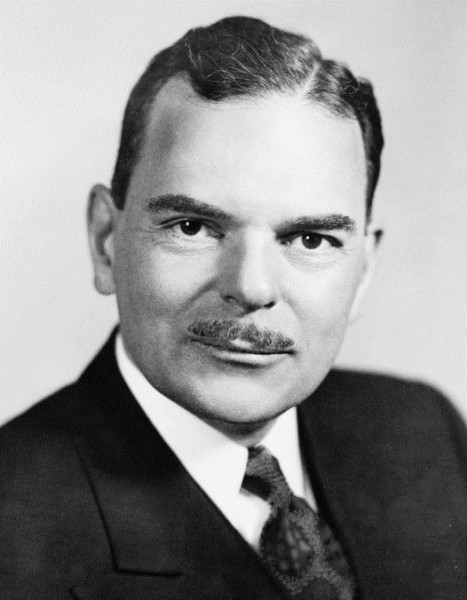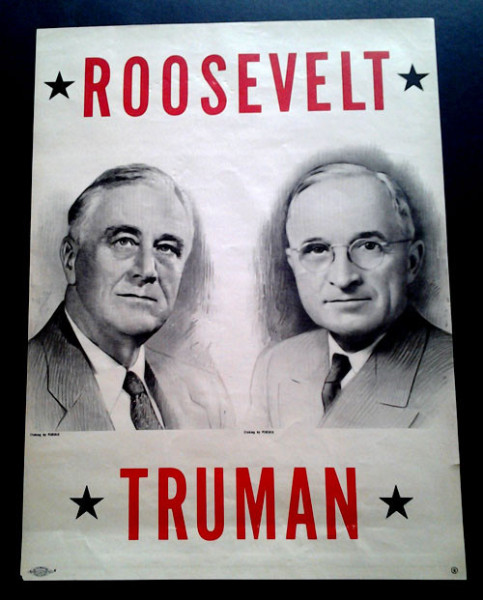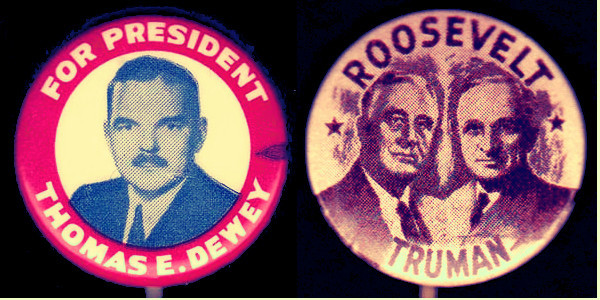Familiar-Sounding Themes of the Presidential Campaign of 1944
The speaker strode to the McClure Hotel Ballroom podium. The polite applause that began with his introduction grew into a more enthusiastic display of approval with every step forward he took. The clapping tapered off as he arranged his papers and adjusted the tiny reading glasses on his nose. It was election season, and with only a week to go before the polls opened to an energized American public, both sides in the traditional political quarrels were elevating their rhetoric and making their case. On this November day in 1944, the Wheeling Federation of Republican Women’s Clubs were being rallied to action by a well-known Wheeling attorney.
The times they are a-changin’
We’re here to turn the page
It’s the same old story
But it’s told a different wayJon Bon Jovi
“Mr. Roosevelt is a Christian man,” began the speaker, “but without appreciating the full consequences of his conduct, he is allowing himself to be dominated by a group who are deliberately bent on ruling out of your individual affairs the power to determine what church you should believe in, under what doctrines you should bring up your children, or what faith you should follow. Possibly unwittingly, but probably not, he has led this country into a condition that will deprive our children of the rights we had when we were born. God only knows that Mr. Roosevelt is catering to the Communistic element. In 1933 he pardoned 3,000 Communists who would have been sent to the penitentiary….
“As a free American citizen I feel that I should have the right to bring up my children without any dominations from any ilk or foreign country. They can speak all they want to about the Four Freedoms; I don’t want the time to arrive when a group will tell me how to live and bring up my children. It’s going to be too late if this man succeeds again. We don’t want the Red International in place of the Star Spangled Banner….
“On our dollar is inscribed the words: ‘In God We Trust.’ Only one element of the people don’t follow this doctrine. Only one group doesn’t believe in God. The most important thing we have to consider in this election is whether you are going to follow the dictates of your conscience and follow the original import of ‘In God We Trust.'”
The day after the speech, Tom Minns sat behind the candy counter of his quiet little confectionary across from Centre Market as a 14-year-old neighbor boy read a story about the talk aloud from the Wheeling Intelligencer. Tom was a lifelong Democrat, kept abreast of current affairs and had political opinions that he never expressed outside close friends and family. He squirmed in his chair as the boy read. The teenager had a good strong voice and was one of several young people that Tom would reimburse to the tune of 25 cents for every time they read both Wheeling papers aloud to him.
“Holy cow, Mr. Minns,” the boy exclaimed when he finished the article. “Is Roosevelt really a communist?”

“No son, not hardly,” Tom answered.
“Then why are they saying it?” the boy asked. “Ain’t it wrong to lie about people?”
“Well, it’s complicated,” Tom said. “It’s politics. The object of that game is to get people to believe a certain way so they will vote a certain way. People running for office have been saying ugly things about each other since the beginning just to get people frightened and angry about what their opponents might do if they were elected. Do you remember that article you read me a few months ago by that writer out of Baltimore named H.L. Mencken?”
“Not sure,” the young reader answered.
“Well, I remember something of it,” Tom said. “I had you read it several times because I wanted to commit it to memory. He wrote that, and I quote, ‘the whole aim of practical politics is to keep the populace alarmed, and hence clamorous to be led to safety, by menacing it with an endless series of hobgoblins, all of them imaginary.’”
“Well, I don’t know what hobgoblins are, but shouldn’t they want us to be more scared of the Japs and the Nazis so we will work harder to beat them?” the boy asked.
“They would rather you concentrate on thinking the worst of their opponent,” Tom said. “The thing is, this speaker delivered his remarks in front of an audience that already agreed with him–the Federation of Republican Women’s Clubs for goodness sakes. Their real objective is to reach people through newspaper stories like this one who can be convinced to vote against their own interests by making them scared, even if they have to stretch the truth to do it. In this case, the target is President Roosevelt, who has done more to help families like yours and mine than just about anybody else in politics I can think of. I think the Republicans believe they are doing the right thing for the country. And they aren’t doing anything that the Democrats probably haven’t done in other elections like when they railed against Hoover’s policies.
“As to your point about the Japs and the Nazis, yes, that should be front and center of our concerns. But they are saying that the war shouldn’t be a factor in the election because political parties don’t conduct the wars and we will win no matter who is president. But the war is a critical factor in all this. The fact is Roosevelt is being called a Communist because he is treating Stalin with kid gloves so we can keep them focused on fighting the Japanese once the Germans are beat. We don’t want the Russians to be our enemies, especially now. It would be harmful to our country to get into a spat with Stalin so we better play ball right now and tackle one problem at a time.”
“Shouldn’t somebody do something?” the boy asked.
“The best thing folks can do is to keep out of the political fray, vote our conscience and support whoever comes out the winner,” Tom said. “I’m inclined to not get involved in this political stuff. It’s bad for businesses.”
The next night, Tom tuned into WWVA to hear a prominent national speaker who hailed from just across the river in Bellaire, Ohio. Frank Wallace was an Ohio Valley hometown hero of sorts. Born and raised in Bellaire, Frank’s siblings recognized his writing talent and took up a collection to send him to Notre Dame, where he studied hard and became a press intern to legendary coach Knute Rockne. After graduating, Wallace became a nationally recognized sports writer for New York newspapers and big-time magazines. He branched out into fiction writing and eventually wound up in Hollywood writing movie scripts for sports-oriented films like the 1930s “Kid Galahad.” He always considered the Ohio Valley as Home and he was in the area frequently. He also got involved with politics. He eventually ran and was defeated in an election in Ohio for the U.S. House of Representatives. However, he always claimed he “won the intelligent vote.”
Tom, an avid fan of all things Notre Dame, held high respect for Wallace’s articles, and books. Of course he didn’t go to the movies, but he had heard the kids in his store talk about them and became a second-hand admirer of their storytelling and topics. Tom had heard about Wallace’s upcoming radio talk and its topic, “New Deal Revolution.” He tuned in to hear what a man he admired had to say about programs he believed in.
“In the old days there was no difference between the two major parties,” Wallace’s radio speech began. “We chose up sides, had it out, shook hands, and were never really worried if the other side won because we knew the country would go on playing the American game we all understand and had prospered under.”
Tom leaned forward in his dining room chair to focus on the speaker’s words as they came from his tired little radio on the nearby table. Wallace said the war wasn’t an issue because America was going to win. He said the peace wasn’t an issue because it was just common sense to join an international peace organization (the then-proposed United Nations) which will try to prevent wars. Then he got to his point.
“We find the vital issue of this campaign at home and it is this: Shall we continue our traditional way of life or take another long and perhaps decisive step toward some form of European state socialism? Obviously we cannot look upon this election as just another sporting event when the issue is the existence of the American game itself.”
Tom began to squirm. He grew more uncomfortable over the words from his fellow Notre Dame advocate.
“I believe that the New Deal party, though born of honesty and a beautiful dream of brotherhood, has become so contaminated by politics, that it has grown into an illegitimate un-American party, a party of revolution rather than evolution,” Wallace continued. “It has warred upon our traditional way of life, founded on incentive and competition, and seeks to change free Americans into weak creatures dependent upon and subservient to an all-powerful political state. I believe that, consciously or not, it has already gone far along the road to becoming an American counterpart of the Communist party in Russia, the Nazi party in Germany, the Fascist party in Italy, which also absorb the individual into collectivity, exalt the state, and regiment the individual.”
 Tom switched off the radio with a loud click when Wallace had finished. He sat thinking for nearly a half hour before walking over to the telephone and asking the operator to connect him to the Ohio County Democratic Headquarters, where he knew a few people.
Tom switched off the radio with a loud click when Wallace had finished. He sat thinking for nearly a half hour before walking over to the telephone and asking the operator to connect him to the Ohio County Democratic Headquarters, where he knew a few people.
“Hello,” he said to the person who answered. “This is Tom Minns on Market Street. Can you get me over a Roosevelt-Truman campaign sign tonight? I know; I know; I never wanted to put up signs before. This time is different.”
Note: Real quotes from real stories from the real Wheeling Intelligencer of November 1944.



